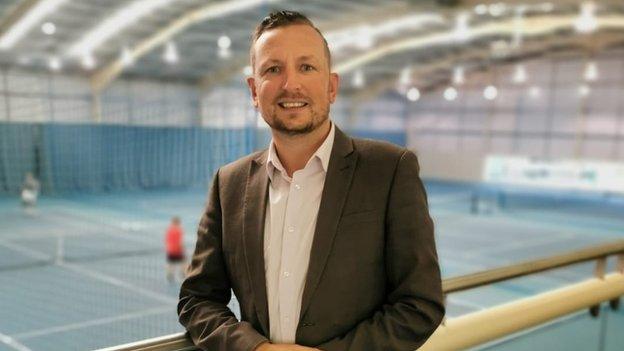Players health is main priority says WRPA chief Barry Cawte
- Published

Barry Cawte was appointed the Welsh Rugby Players' Association in September 2019
Welsh Rugby Players Association chief Barry Cawte says the country's top performers will only return when it is safe to resume playing.
Wales players will take a 25% pay cut because of the coronavirus crisis.
Regional rugby is on hold after the Pro14 has been indefinitely suspended, while Wales' summer tour of Japan and New Zealand is unlikely to be held in June and July.
"The most important thing is we don't put our players at risk," said Cawte.
The WRPA says there will be no pressure on a return to action with a vaccine being sought for the pandemic with players safety more important than rushing them back.
"No decision will be made lightly around getting players back on the field and training," Cawte told the Scrum V podcast.
"We will be guided by the science and medicine and what the Government say. Health is the number one priority and nobody wants to put the players on the field if it is not safe to do so."
No date has been set for a rugby return with a possibility of the game not coming back until at least the autumn.
"There are a number of things that could happen if the game does not start getting played. Economically it could cause massive financial losses and with that you could see redundancies and contracts being ended," warned Cawte.
"Taking the pay cuts in these first three months are a way of safeguarding that from happening.
"If the position does not improve those are the kind of measures you take now to prevent the offset of that happening later in the year.
"Everything we do now is about making sure there is likelihood of that happening in six months time."
The Professional Rugby Board (PRB), representing the Welsh Rugby Union (WRU) and the four regions - Cardiff Blues, Dragons, Ospreys and Scarlets - reached the pay agreement with the WRPA.
The players body initially wanted to defer 25% of players' monthly gross basic salaries from April until August, with the deferred money then paid next year.
Instead, players will have their salaries cut by 25%, as was announced earlier for Wales head coach Wayne Pivac and WRU chief executive Martyn Phillips. The cut does not apply to players earning £25,000 a year or less.

Wales reached the semi-finals of the 2019 Rugby World Cup in Japan
"The process is complex," said Cawte.
"We were one of the first trade union, union and professional clubs to come to a collective agreement on pay cuts, not an easy thing.
"You are talking about 200 players with some who have contracts, some coming to an end, some retiring and some are injured.
"It's not a straightforward process. That figure (25%) is what we established works for right now and felt what most people can handle."
Cawte outlined what might happen if an agreement on pay cuts had not been reached.
"You would be seriously worried about the economic state of the game because of the uncertainty," said Cawte.
"The players wanted to make sure the game could be safeguarded and they all have jobs to come back to.
"The worst case scenario is if we are not looking after the economics we could be sat here in months with very little intact.
"Taking the pay cut reflects the desire to show the players don't mind taking sacrifices to keep them and colleagues in the game and put some rugby on the television so we have enjoyment coming out of this difficult period."
The salary reduction is effective from 1 April and will last three months when it will be reviewed. There will be some players who were due to leave a club on June 30 and start a new contract on 1 July.
"The nature of a collective bargaining agreement is it will cover 90-95% of our player base but there will be some who have extraordinary circumstances where they could be retiring or coming to the end of their contracts," said Cawte.
"We have to work that through over the next few weeks because the timing is getting onto us."